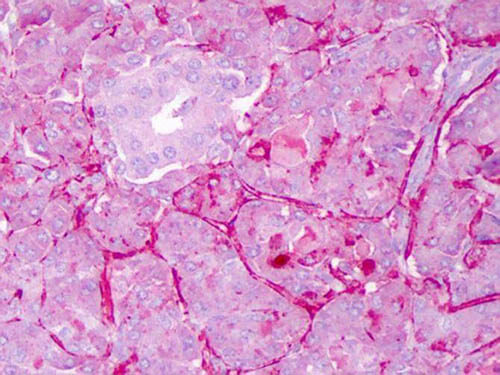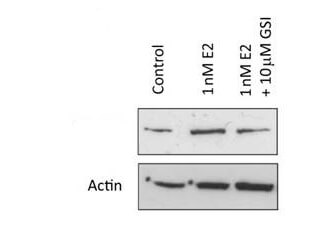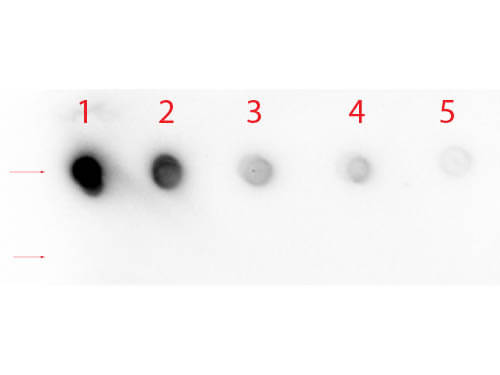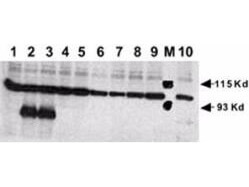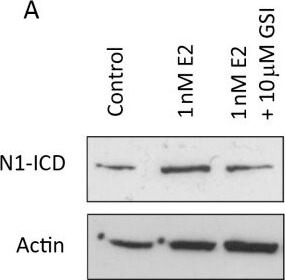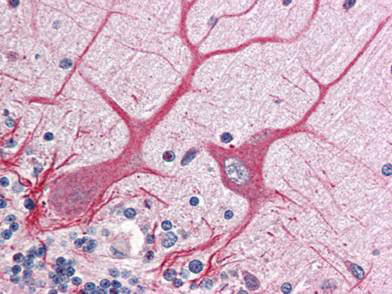Datasheet is currently unavailable. Try again or CONTACT US
NOTCH 1 Antibody
Rabbit Polyclonal
9 References
100-401-407S
100-401-407
25 µL
200 µL
Liquid (sterile filtered)
Liquid (sterile filtered)
WB, ELISA, IHC, IF, Dot Blot, IP, Multiplex
Human, Mouse
Rabbit
Shipping info:
$50.00 to US & $70.00 to Canada for most products. Final costs are calculated at checkout.
Product Details
Anti-NOTCH 1 (Cleaved N terminal) (Human specific) (RABBIT) Antibody - 100-401-407
rabbit anti-notch1 antibody, Neurogenic locus Notch homolog protein 1, hN1, Translocation-associated Notch protein TAN-1
Rabbit
Polyclonal
Antiserum
Target Details
NOTCH1 - View All NOTCH1 Products
Human, Mouse
Conjugated Peptide
This whole rabbit serum was prepared by repeated immunizations with a synthetic peptide corresponding to amino acid residues of human Notch 1 located near the N-terminal sequence of the cleaved N intracellular domain (NICD).
This antiserum is directed against human NOTCH 1. Based on the immunogen sequence, we expect this antibody to react as well with mouse and rat NOTCH 1 (100% sequence homology). This antibody reacts with mouse Notch constructs present in lysates of HEK 293 cells. Only the cleaved intracellular (activated) form (NICD) is detected. No reactivity is detected against mouse N2, N3 or N4. The immunogen epitope is only exposed after gamma secretase cleavage and is not accessible in the uncleaved form.
Application Details
Dot Blot, ELISA, IHC, WB
IF, IP, Multiplex
- View References
Anti-Notch 1 has been tested by ELISA, dot blot, western blot and immunohistochemistry. An 80 kDa band corresponding to Notch 1 was observed at a 1:500 dilution. Specific conditions for reactivity should be optimized by the end user.
Formulation
90 mg/mL by Refractometry
0.02 M Potassium Phosphate, 0.15 M Sodium Chloride, pH 7.2
0.1% (w/v) Sodium Azide
None
Shipping & Handling
Dry Ice
Store vial at -20° C prior to opening. Aliquot contents and freeze at -20° C or below for extended storage. Avoid cycles of freezing and thawing. Centrifuge product if not completely clear after standing at room temperature. This product is stable for several weeks at 4° C as an undiluted liquid. Dilute only prior to immediate use.
Expiration date is one (1) year from date of receipt.
Anti-Notch 1 Antibody recognizes Notch 1 that is synthesized in the endoplasmic reticulum as an inactive form which is proteolytically cleaved by a furin-like convertase (S1 cleavage) in the trans-golgi network before it reaches the plasma membrane to yield an active, ligand-accessible form. Cleavage results in a C-terminal fragment N(TM) and a N-terminal fragment N(EC). Following ligand binding, it is cleaved (S2 cleavage) by TNF-alpha converting enzyme (TACE) to yield a membrane-associated intermediate fragment called Notch extracellular truncation (NEXT). This fragment is then cleaved by presenilin-dependent gamma-secretase (S3 cleavage) to release the intracellular domain (NICD) from the membrane.
Li X et al. (2022). Podocyte-specific deletion of miR-146a increases podocyte injury and diabetic kidney disease. Front Med (Lausanne).
Applications
IF, Confocal Microscopy
Iervolino A et al. (2020). Potassium depletion induces cellular conversion in the outer medullary collecting duct altering Notch signaling pathway. Sci Rep.
Applications
WB, IB, PCA
Lee et al. (2017). Absence of miR-146a in Podocytes Increases Risk of Diabetic Glomerulopathy via Up-regulation of ErbB4 and Notch-1. Journal of Biological Chemistry
Applications
IF, Confocal Microscopy; WB, IB, PCA; Multiplex Assay
Manderfield et al. (2015). Hippo signaling is required for Notch-dependent smooth muscle differentiation of neural crest. Development
Applications
IP, Co-IP
Harrison H et al. (2013). Contrasting hypoxic effects on breast cancer stem cell hierarchy is dependent on ER-α status. Cancer Res
Applications
WB, IB, PCA
Harrison H et al. (2013). Oestrogen increases the activity of oestrogen receptor negative breast cancer stem cells through paracrine EGFR and Notch signalling. Breast Cancer Res
Applications
WB, IB, PCA
Poli EF et al. (2013). Murine neural stem cells model Hunter disease in vitro: glial cell-mediated neurodegeneration as a possible mechanism involved. Cell Death Dis
Applications
WB, IB, PCA
Gupta S et al. (2009). Effect of Notch activation on the regenerative response to acute renal failure. Am J Physiol Renal Physiol
Applications
WB, IB, PCA
Solomon A et al. (2008). Upregulation of the let-7 microRNA with precocious development in lin-12/Notch hypermorphic Caenorhabditis elegans mutants. Dev Biol.
Applications
WB, IB, PCA
This product is for research use only and is not intended for therapeutic or diagnostic applications. Please contact a technical service representative for more information. All products of animal origin manufactured by Rockland Immunochemicals are derived from starting materials of North American origin. Collection was performed in United States Department of Agriculture (USDA) inspected facilities and all materials have been inspected and certified to be free of disease and suitable for exportation. All properties listed are typical characteristics and are not specifications. All suggestions and data are offered in good faith but without guarantee as conditions and methods of use of our products are beyond our control. All claims must be made within 30 days following the date of delivery. The prospective user must determine the suitability of our materials before adopting them on a commercial scale. Suggested uses of our products are not recommendations to use our products in violation of any patent or as a license under any patent of Rockland Immunochemicals, Inc. If you require a commercial license to use this material and do not have one, then return this material, unopened to: Rockland Inc., P.O. BOX 5199, Limerick, Pennsylvania, USA.

